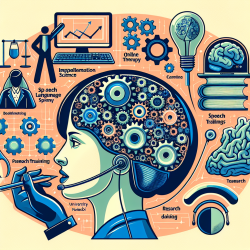Introduction
In the ever-evolving field of healthcare, bridging the gap between evidence-based interventions and real-world application is crucial. The University of Nairobi's initiative to build capacity in implementation science is a beacon of progress, offering valuable insights for practitioners worldwide. This blog explores how the outcomes of this research can enhance your practice, particularly in online therapy services for children, and encourages further exploration in this vital field.
The Power of Implementation Science
Implementation science is defined as the study of methods to promote the integration of research findings and evidence into healthcare policy and practice. It addresses the "know-do" gap, a persistent issue where proven interventions are not effectively translated into practice. For practitioners, understanding and applying implementation science can lead to improved service delivery and better health outcomes.
Key Findings from the University of Nairobi's Program
The University of Nairobi, with support from the Medical Education Partnership Initiative, developed a comprehensive training program in implementation science. Key elements include:
- Core curriculum covering implementation science theory, methods, and practical experiences.
- Team mentoring and supervision approach, leveraging partnerships with institutions like the University of Washington and University of Maryland.
- High participant satisfaction, highlighting the program's effectiveness and relevance.
These components create a robust framework for training professionals capable of designing, implementing, and evaluating evidence-based interventions.
Applying These Insights to Online Therapy
For practitioners in online therapy, particularly those working with children, the principles of implementation science can be transformative. Consider these applications:
- Evidence-Based Practice: Utilize data and research to inform therapy methods, ensuring interventions are grounded in proven efficacy.
- Collaboration and Mentorship: Foster partnerships with other professionals and institutions to enhance learning and application of new strategies.
- Continuous Evaluation: Regularly assess the effectiveness of interventions and adapt based on outcomes and feedback.
Encouraging Further Exploration
The University of Nairobi's program is a model for capacity building in implementation science, but the journey doesn't end there. Practitioners are encouraged to delve deeper into this field, exploring how implementation science can be tailored to their specific contexts and challenges. This exploration not only enhances individual practice but also contributes to the broader goal of improving healthcare delivery worldwide.
Conclusion
By embracing the principles of implementation science, practitioners can drive meaningful change in their fields. The University of Nairobi's initiative provides a blueprint for success, demonstrating the impact of well-designed training programs. As we continue to bridge the gap between research and practice, the potential for improved outcomes in online therapy and beyond is limitless.
To read the original research paper, please follow this link: Building capacity in implementation science research training at the University of Nairobi.










